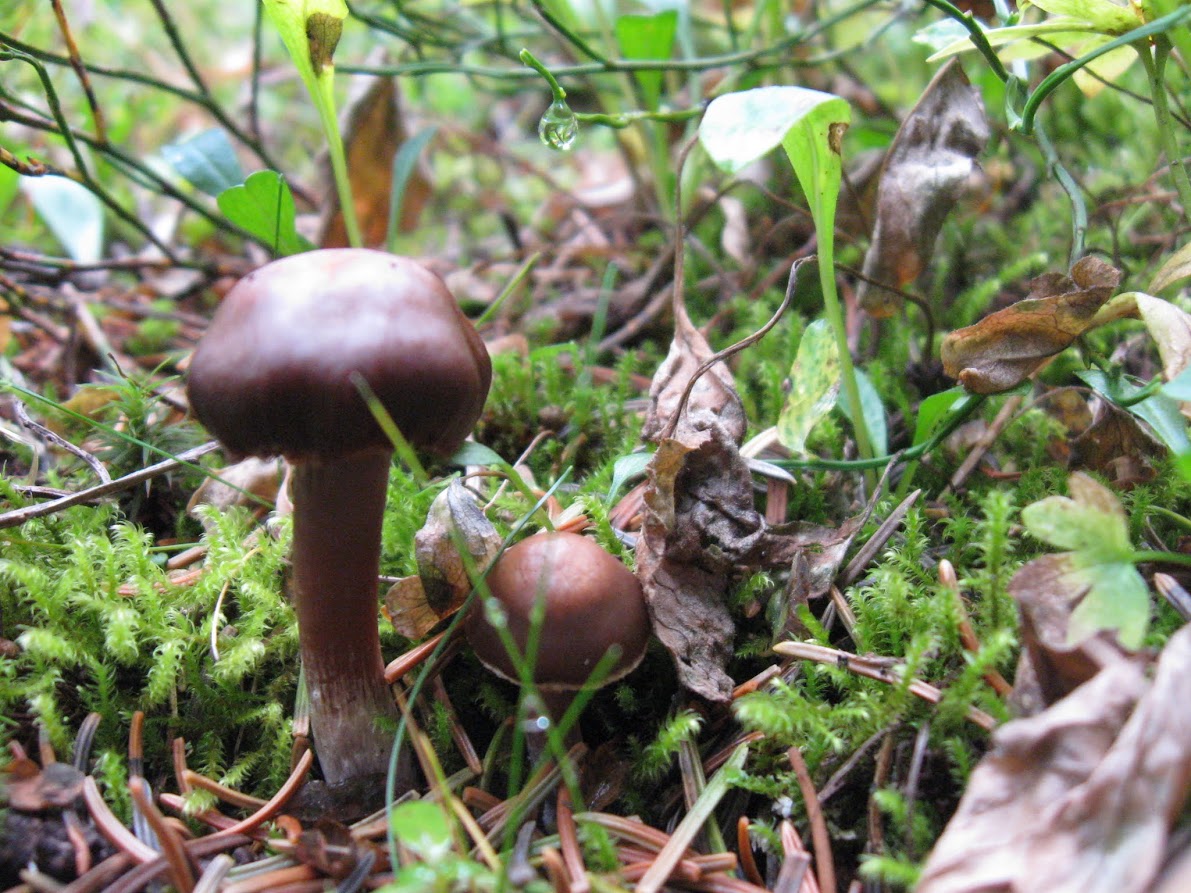In the last days of the fourth world I wished to make a map for
those who would climb through the hole in the sky.
My only tools were the desires of humans as they emerged
from the killing fields, from the bedrooms and the kitchens.
For the soul is a wanderer with many hands and feet.
The map must be of sand and can’t be read by ordinary light. It
must carry fire to the next tribal town, for renewal of spirit.
In the legend are instructions on the language of the land, how it
was we forgot to acknowledge the gift, as if we were not in it or of it.
Take note of the proliferation of supermarkets and malls, the
altars of money. They best describe the detour from grace.
Keep track of the errors of our forgetfulness; the fog steals our
children while we sleep.
Flowers of rage spring up in the depression. Monsters are born
there of nuclear anger.
Trees of ashes wave good-bye to good-bye and the map appears to
disappear.
We no longer know the names of the birds here, how to speak to
them by their personal names.
Once we knew everything in this lush promise.
What I am telling you is real and is printed in a warning on the
map. Our forgetfulness stalks us, walks the earth behind us, leav-
ing a trail of paper diapers, needles, and wasted blood.
An imperfect map will have to do, little one.
The place of entry is the sea of your mother’s blood, your father’s
small death as he longs to know himself in another.
There is no exit.
The map can be interpreted through the wall of the intestine—a
spiral on the road of knowledge.
You will travel through the membrane of death, smell cooking
from the encampment where our relatives make a feast of fresh
deer meat and corn soup, in the Milky Way.
They have never left us; we abandoned them for science.
And when you take your next breath as we enter the fifth world
there will be no X, no guidebook with words you can carry.
You will have to navigate by your mother’s voice, renew the song
she is singing.
Fresh courage glimmers from planets.
And lights the map printed with the blood of history, a map you
will have to know by your intention, by the language of suns.
When you emerge note the tracks of the monster slayers where they
entered the cities of artificial light and killed what was killing us.
You will see red cliffs. They are the heart, contain the ladder.
A white deer will greet you when the last human climbs from the
destruction.
Remember the hole of shame marking the act of abandoning our
tribal grounds.
We were never perfect.
Yet, the journey we make together is perfect on this earth who was
once a star and made the same mistakes as humans.
We might make them again, she said.
Crucial to finding the way is this: there is no beginning or end.
You must make your own map.
economic hope and the smell of mushrooms
i’m finally understanding the creative block i’ve been feeling since visiting my parents in arizona last month. it’s related to the tension between, on the one hand: the ongoing and active deprivation of hope from where you expect it and, on the other hand: a very steady certainty that there is so much good happening in the world right now.
the mainstream news outlets’ lights and cameras are narrowed to a point, highlighting so much going on, but it all just looks so hopeless. the new supreme court justice being treated with such disrespect. the contrast of growing wildfires with bumper stickers on massive pick-up trucks: “trump 2024, save america.” this media spotlight reinforces a complete lack of vision for the future, let alone suggesting movement toward anything else than what we already know. and then there are the random distractions like will smith punching chris rock. (and then all the memes on social media, and then all of the people giving their opinions about it, and then news outlets pitting them against each other!)
the tension between all of this garbage and the absolute knowing i have that there are SO many amazing leaders, projects, groups doing such great work. “work,” though, is too narrow of a word to describe what i mean: it’s not sitting at a desk, it’s not something you clock into. it has to do with opening up worldviews, creating and repairing cultures, seeing each other in fuller ways. and i can feel it. i’m remembering this shortened version of a quote used as the motto of the US Social Forum by Arundhati Roy: “Another world is not only possible, she is on her way. On a quiet day, I can hear her breathing.” the longer quote has to do with imperialism and capitalism:
“Our strategy should be not only to confront empire, but to lay siege to it. To deprive it of oxygen. To shame it. To mock it. With our art, our music, our literature, our stubbornness, our joy, our brilliance, our sheer relentlessness – and our ability to tell our own stories. Stories that are different from the ones we’re being brainwashed to believe.
The corporate revolution will collapse if we refuse to buy what they are selling – their ideas, their version of history, their wars, their weapons, their notion of inevitability.
Remember this: We be many and they be few. They need us more than we need them.
Another world is not only possible, she is on her way. On a quiet day, I can hear her breathing.”
― Arundhati Roy, War Talk (2003)
but what does she say after that?? (adding reading that book to my library’s waitlist right now!)
so what i feel compelled to do is write into each of these things that are happening. to show them as an interconnected movement, a thriving ecosystem complete with several kinds of functioning parts – composers, pollinators, whatever other parts there are (ha!)
not to overwhelm us even more, but to let people know what is happening. not just to give us hope, but also to showcase the variety of what we could get more involved in. maybe for each section that could be a little part: how to get involved locally – what it takes, what you need. (and maybe those could connect later to parts of the personal work, thinking specifically about decolonial projects.)
like i want to inspire and excite people by sharing this sense of knowing i have – of how much is happening! so we can stop looking at where the lights and cameras are pointed and see all of what else there is. we get to be ecologists, to look into all of the parts that are happening, get our hands dirty in the soil, smell fresh air. but like… economically.
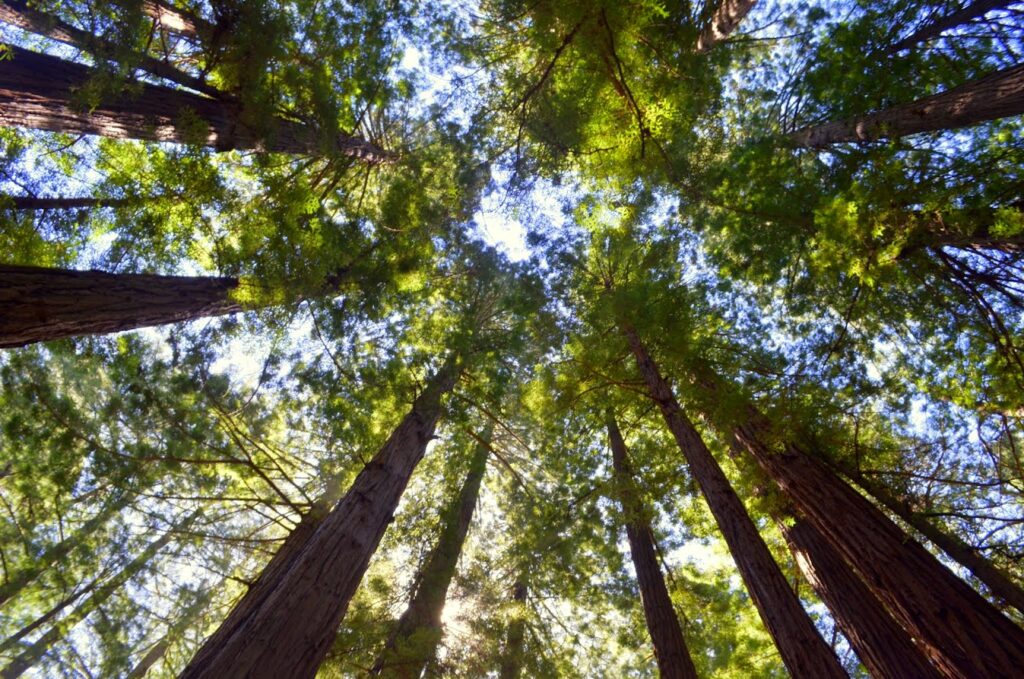
really when was the last time you felt invigorated economically? i mean something similar to those feelings you get in a healthy forest: filling your lungs up with the dense humidity of a lush, damp forest; taking in the honey-like notes of pine sap; the slight decomposing sense of mushrooms’ presence; hearing bird chirps far up in the canopy; your movement silenced by pine needles underfoot.
i can say for sure that i have a visceral feeling when i pay my taxes. maybe that would be akin to the choking smell of coming across a dead animal in the forest. but i mean, when was the last time i felt something good in my body because of my relationship to economics?
i used to have that feeling, the slight tingling feeling: “yes, i’m saving the world,” kind of thing happen at farmers markets, or purchasing at my community food co-op (of which i was a member). i remember that feeling when seeing visionary art (favianna rodriguez comes to mind) that invites my true self into economics (not just an outstretched hand with dollar bills). hearing gopal from movement generation speak about their visions for the future. i definitely felt a lot while i was organizing for occupy on my university campus (not as an undergrad, i’m not that young!). and i felt new sensations like a folding of time from past to future while i was supporting the sogorea te’ land trust in “oakland” “california:” that the way these leaders were thinking was connecting their 5,000+ year old traditions through colonial rupture to a future that continues and preserves what is sacred.
how can we imagine more into this? (one way is to listen to this short episode of the light ahead) what feelings can we hope for, economically? what do we already know in our bodies (not necessarily just the physical ones, but also ancestral, spiritual, etc) that can guide us?
so i guess my creative block is letting up – i’ve got a list and a diagram of the ecological parts of next economies drawn up and am excited to start writing about each of them, sharing examples and ways we can support and/or participate in them. i imagine navigating this landscape like butterflies in migration – moving from the death and decay of capitalism, through decomposition (smelling the mushrooms!), through healing together, to creating next economies that support our “soft animal bodies” (as mary oliver might say).
in the meantime, if you liked the content of this post, you might be interested in this session, happening next week:
Practicing turning toward
The essay I wrote that was published 2 months ago turned into something dense and serious in tone, and since writing it, I find myself wanting to go back, zooming in to certain parts, expanding and magnifying them. The first part that comes to mind is two words: “turning toward.” If I had to distill the whole essay into just two words, those would likely be them.
What they mean to me is a compacted version of a shift in how we relate: from avoiding to embracing. We can do this on so many levels – with parts of ourselves, other people, whole peoples, and probably life itself.
Today I rather serendipitously attended two very different events but both ended up being about this turning toward-ness, so I figured I should write about it.
If one of the core pieces of our work moving forward is repairing relationships, turning toward is one of the first steps. Where we avoid, disconnect, numb, separate, ignore – parts of ourselves, other people, etc. – we could instead welcome in, befriend, turn toward, cultivate curiosity for.
The first event I attended today was called Clearing Creative Blocks facilitated by Veronica Amarelle. She led about 300 of us through a guided meditation to turn toward whatever creative block we’re facing at the moment. What came up for me in the session was the idea of “trying to write the right thing” as getting in the way of my flow. Overthinking, tending toward perfectionism patterns, efforting in ways that don’t serve the work like trying to write as if I am an authority – these things have been actively getting in the way of my progress and process lately. However, sitting with this block while being guided through a meditation, I was invited to ask the block about what it wants for me. What I came up with was remembering to tap into a big and deep knowing. That it’s not so much about me “getting it right,” but more about connecting to something much bigger than myself – maybe something like a muse or collective consciousness or something else we don’t have a good word for yet.

We were invited to turn what we learned from the experience into an affirmation. In the session I also shifted my relationship to affirmations, which I came to understand as a potential for visualizing and remembering when I’ve felt this way in the past. Rather than imagining a scenario in the future where I feel the affirmation to be true, I can look into my past for examples where it already has been true. When have I felt tapped into a deeper knowing? Most of the examples were when I was with loved ones in vast natural spaces.
The second event was part of the Buddhism and Ecology Summit, an Zoom event called The Alchemy of Despair facilitated by Willa Blythe Baker. She offered a guided meditation where we were invited to bring whatever feelings we were having into the session, rather than trying to leave them at the door (which might be how we normally treat feelings in a meditation session). In the chat after, she shared how, by moving toward despair, particularly in relationship to climate change, we can understand it as a “symptom of our tenderness:” our ability to care about what’s happening in the world. Despair is a symptom of our compassion, our care, our love.
Feelings, like despair and others, she said are “only incapacitating if we stay stuck in them. If, instead, we metabolize them and love them, they transform themselves into our allies.”
Willa Blythe Baker
The practice of turning toward emotions we perceive as difficult or as blocks is the practice of self-compassion. The more we learn and practice not to reject, learning to open to, the more receptive and flexible we can be when difficult situations arise.
From this turning point in human history, I spend a lot of time wondering about what we can do to support our flexibility, our collective capacities to flow with what comes next, and to grieve what we’re leaving behind. Avoiding, ignoring, polarizing, separating do not seem to be energies that support that. On the other hand, turning toward, cultivating curiosity, and compassion do seem to be integral (and foundational) to supporting ourselves in this next phase.
A few practices of turning toward that you might find helpful – where to start:
- Willa Blythe Baker’s content on Insight Timer (a phone app, but you can listen at the link, too)
- Yumi Sakugawa creates a lot of content on these practices, including amazing interactive webinars, books like this one and this one, and her instagram feed
- Yoga nidra (or body scans) can be a way to notice and accept physical sensations
- Deeper practices are called by various names: shadow work, parts work and/or internal family systems, chöd, and having tea with your demons.
Advice to Myself (Louise Erdrich)
Leave the dishes.
Let the celery rot in the bottom drawer of the refrigerator
and an earthen scum harden on the kitchen floor.
Leave the black crumbs in the bottom of the toaster.
Throw the cracked bowl out and don’t patch the cup.
Don’t patch anything. Don’t mend. Buy safety pins.
Don’t even sew on a button.
Let the wind have its way, then the earth
that invades as dust and then the dead
foaming up in gray rolls underneath the couch.
Talk to them. Tell them they are welcome.
Don’t keep all the pieces of the puzzles
or the doll’s tiny shoes in pairs, don’t worry
who uses whose toothbrush or if anything
matches, at all.
Except one word to another. Or a thought.
Pursue the authentic-decide first
what is authentic,
then go after it with all your heart.
Your heart, that place
you don’t even think of cleaning out.
That closet stuffed with savage mementos.
Don’t sort the paper clips from screws from saved baby teeth
or worry if we’re all eating cereal for dinner
again. Don’t answer the telephone, ever,
or weep over anything at all that breaks.
Pink molds will grow within those sealed cartons
in the refrigerator. Accept new forms of life
and talk to the dead
who drift in through the screened windows, who collect
patiently on the tops of food jars and books.
Recycle the mail, don’t read it, don’t read anything
except what destroys
the insulation between yourself and your experience
or what pulls down or what strikes at or what shatters
this ruse you call necessity.
Centering Love in Finance (zine)
I randomly found this scan of a zine Kate Poole and I made for our workshop at CommonBound (with Aaron Tanaka!) in 2018, check it out!
Download the PDF version or browse below.
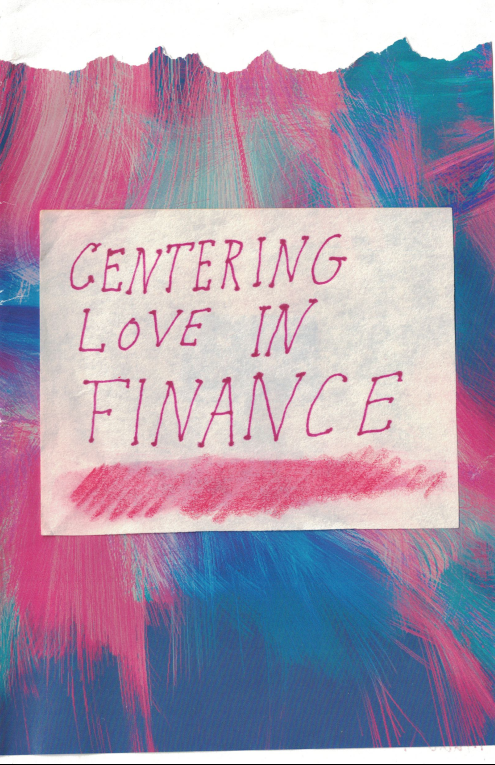
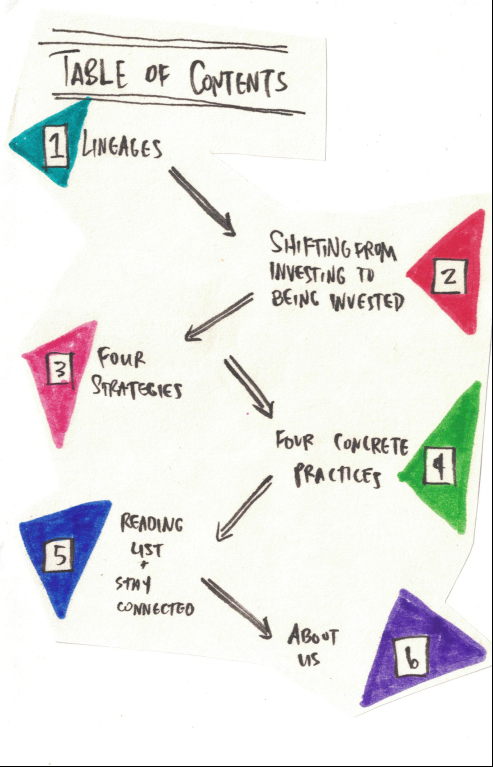
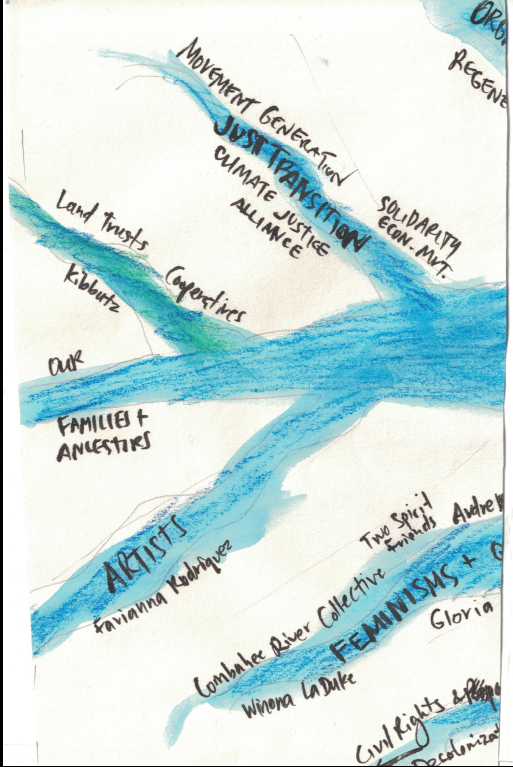
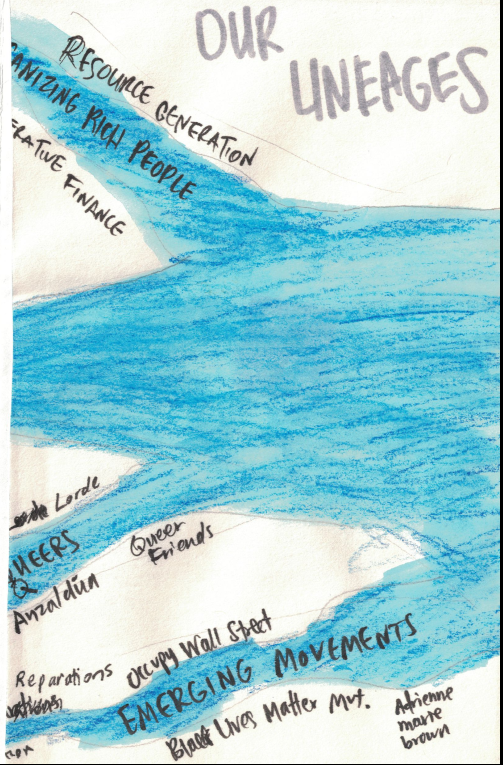
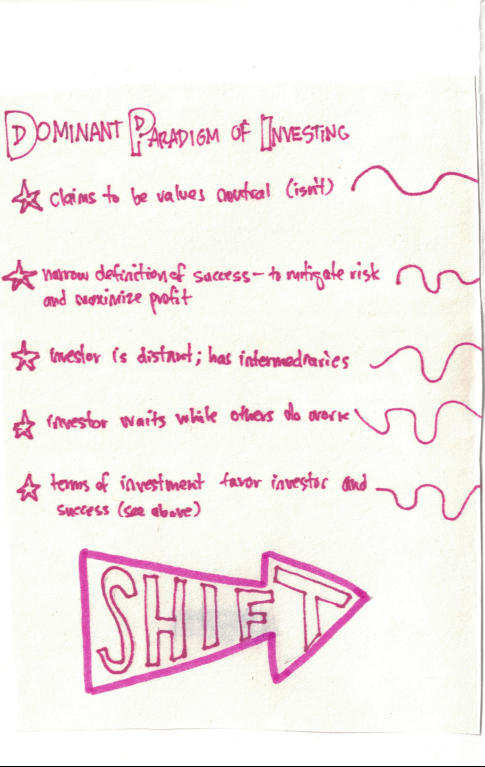
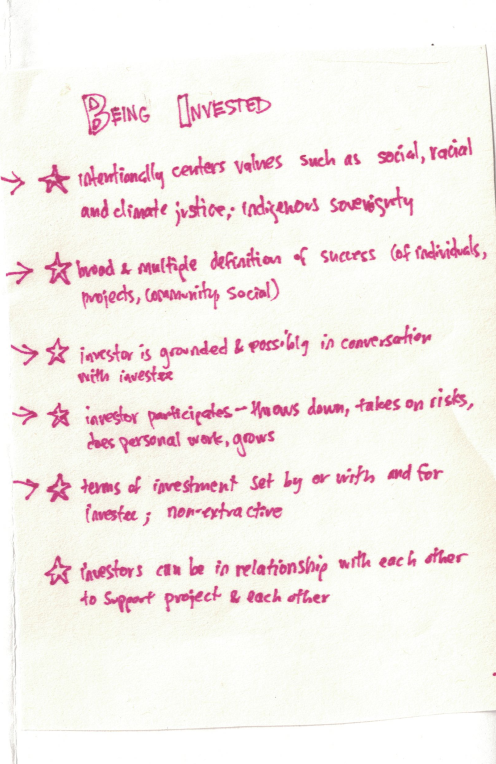
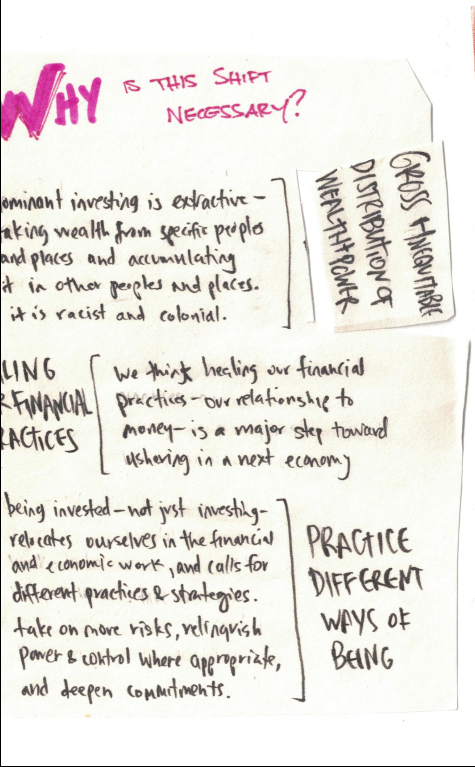
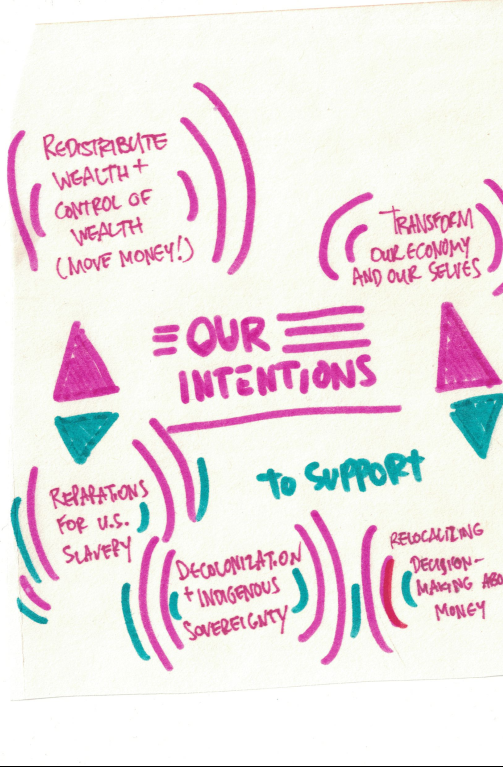
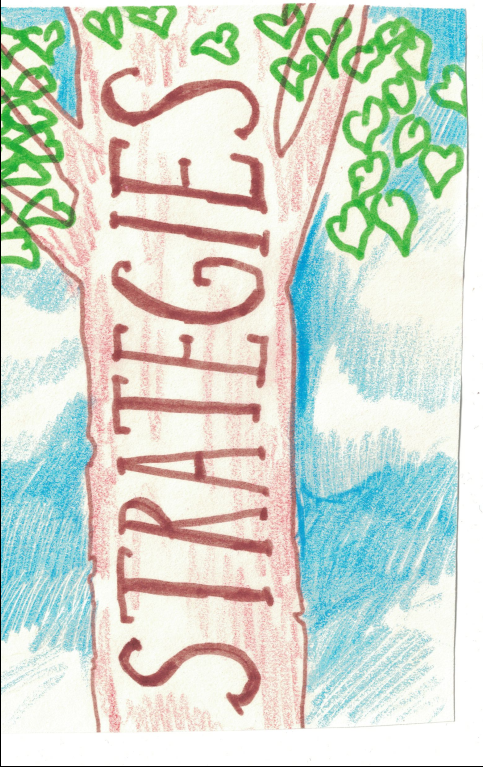
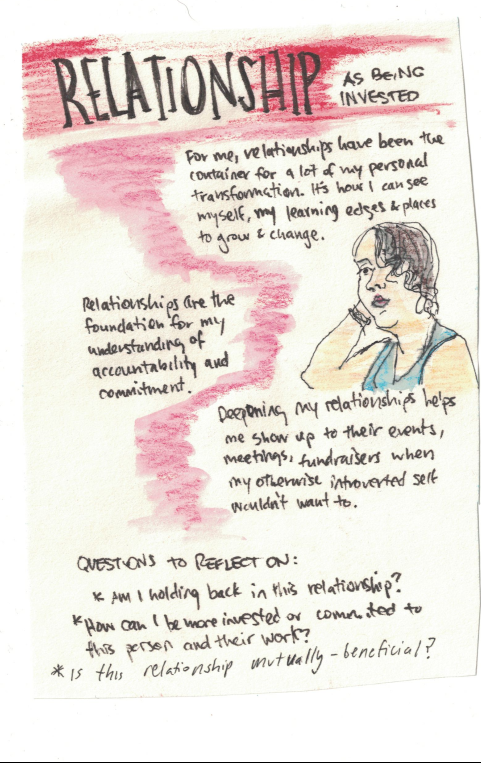
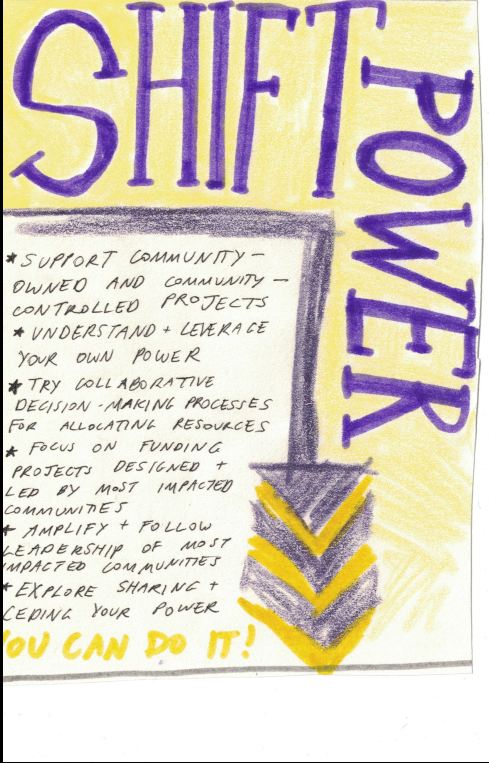
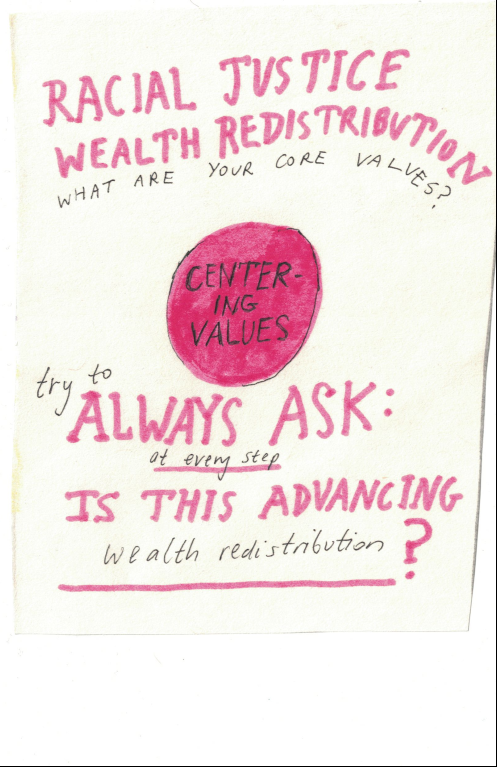
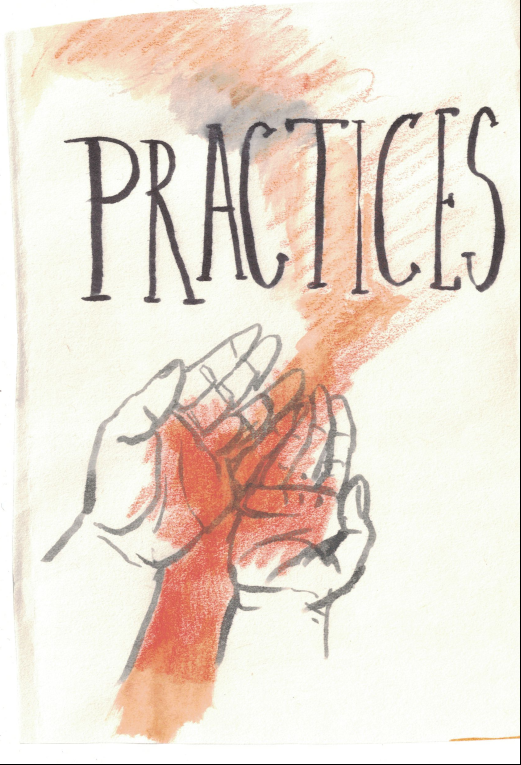
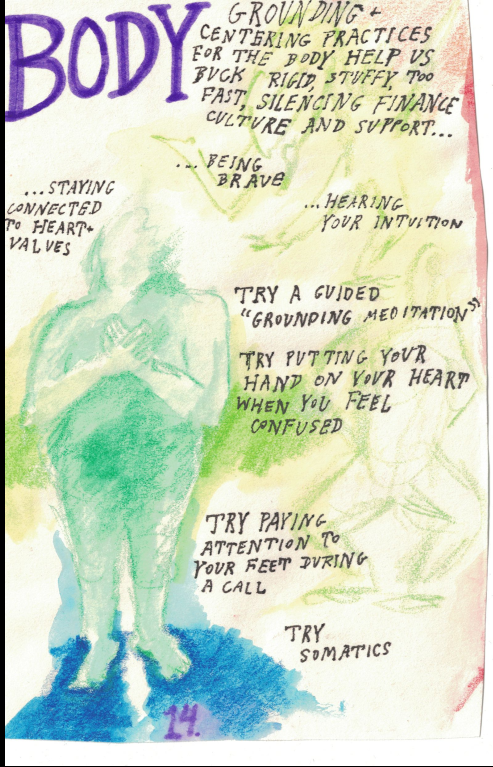
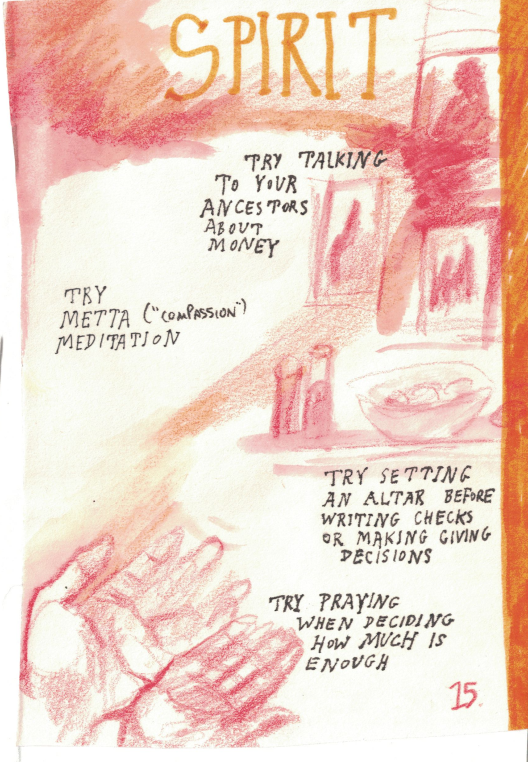
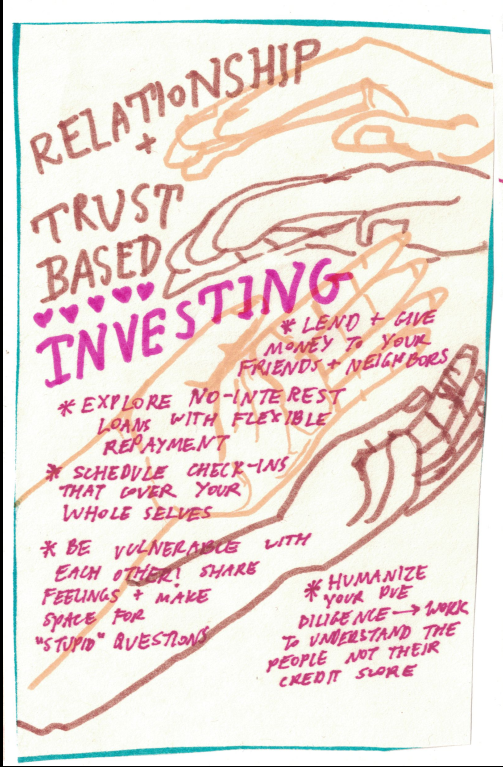
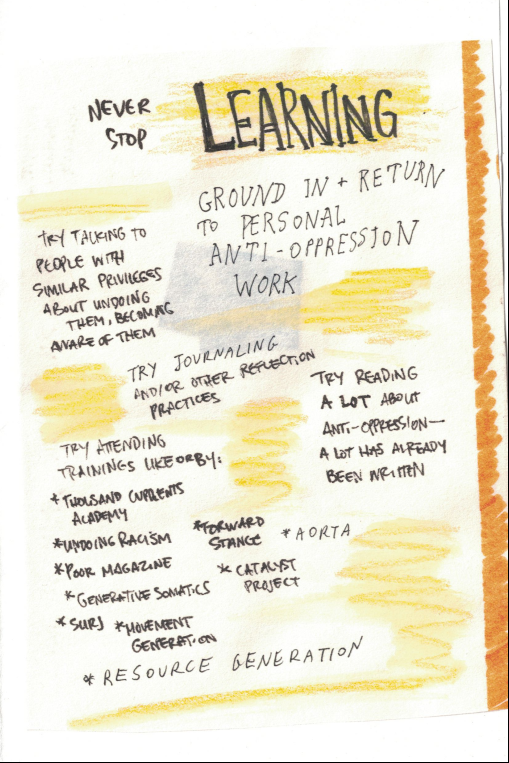
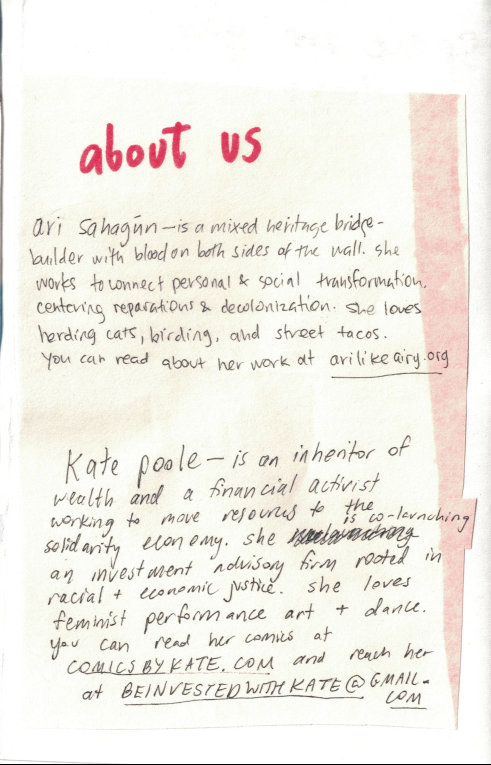
Spider’s webs are their brains
Western science recently figured out that spider’s webs are kind of like extended, out-of-body brains.
Spiders tighten and loosen specific parts of their webs to become more attuned to vibrations, and they can tell the difference between, say, a fly moving around or the wind or other creatures buzzing. This makes sense, as arachnids have been evolving these webs for who knows how many millions of years.
Seeing the spider and web as one and inseparable challenges the ideas we’ve learned about separateness: that there is a spider that is separate from their web. But without a web, the spider couldn’t survive. The spider can’t exist as a disconnected individual.
While this is magical in and of itself, it is also a metaphor for something I’ve been wondering about in networks for a while: how do we embed sensitivity in networks? Rather than thinking about it in a more narrow and mainstream idea of “communications,” how can we think about our activities in networks as sensing? This would have to go hand-in-hand with our work to distribute and decentralize networks – we don’t want to repeat the hierarchical structures of organizations, where only the hubs “hear” about what’s going on – we want to increase access to this hearing/sensing.
We could metaphorically peer into one thread within the network, listen in on what’s happening there. Then put one of our eight arms on another thread and see what’s going on over there. Doing so we are better informed and able to act more strategically – in alignment and harmony – with what is happening elsewhere in the network.
Bees bridge, foxes garden: we expand

I saw this post yesterday on instagram, and then a friend sent me this article, that basically says that Arctic foxes build gardens over the span of many generations, creating nutrient-dense spaces in the harsh climates they inhabit.
Also, did you know that bees build bridges with their bodies and a kind of glue they secrete? It’s called festooning and looks like this:
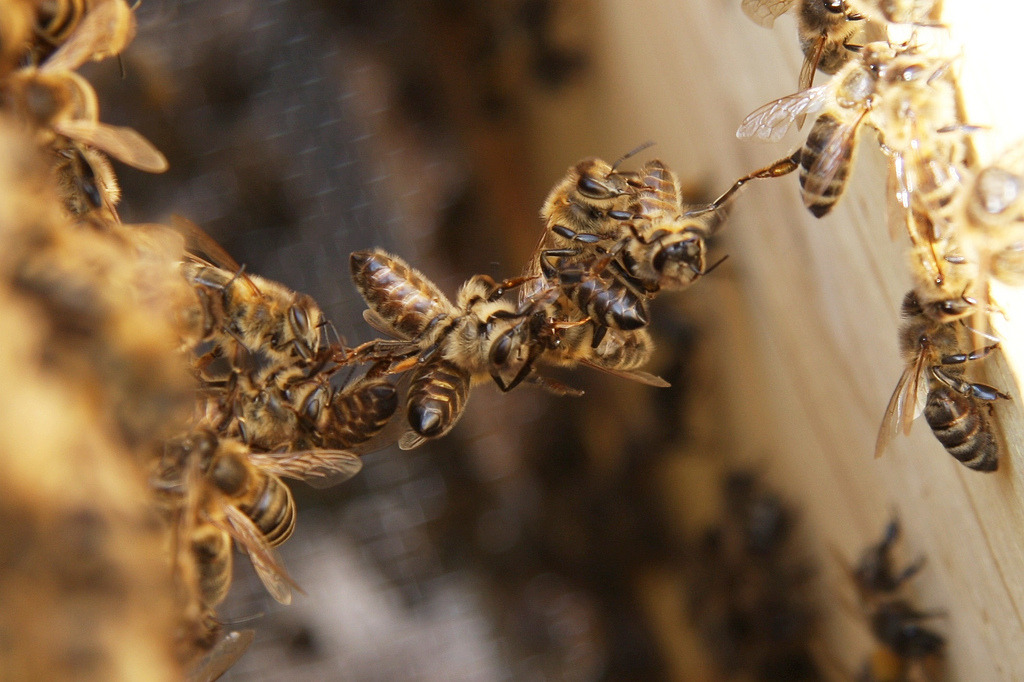
For me one of the ways in which is relate to nature is through awe. Or I could say it this way: being outside or otherwise in contact with the natural world has the potential to fill me with awe, to get me into a state of being bigger than the bounds of my own body – to see and feel and know things I don’t normally consider. In nature we can sense possibilities, sense more for ourselves, than we can from within our human systems.
Technology as “tequio”
This post is a short summary of Yasnaya Elena Aguilar Gil’s essay “Una propuesta modesta para salvar al mundo,” translated into English as “A modest proposal to save the world.” (The original version is in Spanish.)
Adapting technology to suit a new context is not a new practice. However, adapting tech to support collective, rather than capitalist outcomes, may be able to help us move out of some of the pervasive problems inherent in development paradigms.
“Tequio has also become a strategy for meeting everyday needs. Just as the modern-day technology of free, open-source code has enabled collective progress in the digital sphere, the communal labor of tequio raises the possibility of resistance in Abya Yala — and survival of the world at large.”
Technologies have been adapted in Abya Yala, an indigenous name for what’s now called “Latin America,” to serve diverse needs like language preservation and distributed ownership of cellular phone/internet networks.
These needs are a response to colonization and capitalism. Many rural and/or indigenous populations have never been given access to these increasingly necessary forms of communication, so now they are reclaiming and grounding this tech in the own communities. More neutrally called “digital divides,” this unpoliticized and academic understanding points to inequitable gaps in access to and use of online spaces and tools. Aguilar Gil’s essay suggests that these gaps can be bridged by going back to roots of collective and cooperative practices embedded in many indigenous communities:
There is a serendipitous affinity between the logic of collective effort and free cooperation that defines open-source software like Linux and the philosophy of many indigenous communities who built structures to survive the harshness of colonial rule. Both rely on mutual support and small-scale, community-level labor linked into a circuit of larger tasks. Such tequio is an essential “social technology” common across Abya Yala.
This is a continuation of what we might call “self-organizing” – appropriating capitalist/colonial tools to suit decolonizing contexts. Although not necessarily designed as such, tech tools can be used to create spaces for collaboration, cooperation, and community. This happens through a reclaiming – a reclaiming of the intentions and goals from a capitalist, profit-centered model to one that benefits communities.
Reflections on writing one essay
i’ve been in the process of reworking an essay (with very necessary help from my book midwife) that has taken months of re-relating to the initial topic, shifting it, finding new ground, and then losing it. it’s been frustrating that i’ve been writing this essay since august (3+ months now) and i still don’t have a final draft. but the process has been very enlightening and is helping me move more into the space of the book i’ve been working on for a little over a year now. here’s some reflection on the process so far:
if writing the essay was a transformation from what i thought was logically needed (i.e. following BIPOC leadership) to something more spiritual, deeper and more wide-spreading (e.g. seeing the unseen worlds where our post-capitalist dreams live), maybe that’s what i’m feeling about the book, too: an opening to this other level, of moving beyond logic. moving beyond the frames of logic we’ve been given toward something that is more human.
i had a flash upon waking this morning about butterflies and river currents and mushrooms and the worry behind “how would mom see this book” or how would it compare, to say, what my partner is reading now – an academic treatise on the end of capitalism (which he often reads to fall asleep, btw). and how my book doesn’t really respond to that. it doesn’t respond to the last book my partner read either, a chronicling of capitalist thought and practice. i think this is because my ideas are no longer caught in the call and response cycle, precisely because we need to move out of it and into a different kind of relationship to what we know as economy. at this point it’s about our psyches, not just about “mental health” (in a western psychological sense) and how we relate with the world. there’s so much anxiety right now. and so many people also yelling “REST.”
i just paused and read some tweets from @storyofwealth on instagram, which is a pretty good account. the tweets were about how taxing the rich is futile (because if we the people don’t have control over where that money goes, what’s the point anyway). true AND i’m not sure that it gets us into a different paradigm. which is what we need: to be able to see other paradigms, not just this one. this feels like having to swim past the breaking waves near the shore to get to a deep calm: there’s a lot within these dominating systems that try and keep us only able to see what they tell us and nothing beyond that.
so this opening feels like an invitation into magic, into the unseen, into the worlds that are around us but we can’t yet feel or live into. they’re there nonetheless. (could this be faith?)
the feeling of “void”ness or “emptiness” outside of capitalism/colonialism/dominating systems is also part of those systems, not a part of the other(ed) realities. the idea that there’s nothing outside the gender binary is a lie…because outside of it there are billions of genders. though it may feel confusing at first stepping outside, perhaps those are the first steps toward our authentic, real, liberated selves.
i sense that’s how it will be (and is) when we step out of capitalism. though it feels like we’re stepping off a cliff, maybe we realize we have wings. maybe these are the first steps toward true freedom: returning to interconnectedness, collaboration, harmony. through practicing repair, trust, returns. through feeling reckoning, grief, and also joy, love, wholeness.
i’m still in this tension with SPEAKING IN A WAY THAT IS LEGITIMATE. speaking in a way where my argument is logical, rational, and follows the rules of dominating culture. (perhaps my role is one of codeswitcher.) i’m pretty (ok, very) sure that that is just part of staying stuck in the same paradigm. AND WE KNOW IT’S WRONG. we know the dominating paradigm is killing many of us, killing the planet and (literally) life as we know it. why do i need to respond to that? i feel like that has to be a point or two up front in the book: as simple as a bulleted list of the harms of capitalism, citing other authors who’ve already done that legwork, just to make the point that we know it’s wrong.
but we can’t stop there.
because we know there were and are civilizations that have lasted in sustainable, harmonious relationship with the planet for millennia.
the difficult part for me is that what i’m trying to say DOES feel illogical. it FEELS all the ways that these dominating systems de-legitimize all the rest: too “airy,” (pun intended!) fluffy, “woo,” not real, not possible, not at scale so therefore irrelevant. it doesn’t play within the rules of logic. and my well-trained brain, educated within this system, says that this means i’m wrong. this is how i get stuck.
but then i remember Alok (a non-binary poet, fashion icon, and visionary) saying how they don’t want to be legitimized by that system. that’s not part of what they seek as it has nothing to do with their freedom. i appreciate the clarity.
this has to do with my fascination with the absurd: those things we can see and may be able to understand, but then label them illogical and “wildly unreasonable” (per the dictionary definition). if those who determine what is reasonable and what is not are those who decide to drill in the arctic, to create borders to justify their xenophobia, to give guns to kids to shoot other kids in school, those deciding that “justice” is white murderers going free, et cetera ad nauseum. if those are the people deciding what is reasonable, then very clearly this kind of “reason” should have no bearing on where we’re going. (let alone limit our possibilities!)
we can’t wait for legitimization from within dominating systems. (i should really write what i mean by dominating systems if i haven’t already.) it will never come. this would only wear us down and burn us out.
so instead i want to move toward freedom, toward liberation. this move might initially feel uncomfortable. we’ll have to learn how to move not just on our own but in connection with others – relearn how to flow together in community. i guess i believe we can. maybe that’s my FAITH.
this could be such an exciting time in human history. where we oppressors right that which we’ve acknowledged we’ve done wrong. where we can learn from all the diversity of ways we live in relationship with the planet. where we can make decisions with our whole selves: heart, body, mind, and not just a logical part conditioned by rules that aren’t grounded in anything. can you see this? can you start dreaming into this space?
dreaming and hoping and faith. opening past containments that no longer serve us: twisted rules of logic, borders, binaries, fragmenting our selves into parts that are “right” and “wrong,” fragmenting nature into value and waste. this opening as not a one-time event but a repeated, fraught attempt to wrestle past them. it is a wrestling that builds muscles. we persist because we know we need what’s on the other side. we need each other. we need a planet that is healthy. we need joy instead of anxiety, celebration and dance instead of burnout. we need dirty fingernails instead of keyboard-trained hands (hold on while i go plant some tomatoes). we need relationships to our selves based in health and “prevention” instead of treating symptoms. we need communal structures that support all of these things – and in some ways, we have ideas as to what they are: universal basic income, healthcare, labor rights, democracy and shared governance, cooperatives, decolonization of land, reparations for all that was stolen. though most of these ideas come from within the dominating system, they have underpinning values that can set us up and help us practice into what will support us more fully.
all of this accidental essay is to say: i think i am inviting us into being less legible, more illogical and perhaps even absurd as we move beyond these structures of “reason” that don’t serve us. i am inviting us into a place where we can radically imagine cultures grounded in care and connection, in wholeness and harmony. i am inviting us into shifting from seeing endings into seeing beginnings and continuations.

Why Write Love Poetry in a Burning World (Katie Farris)
To train myself to find, in the midst of hell
what isn’t hell.
The body, bald, cancerous, but still
beautiful enough to
imagine living the body
washing the body
replacing a loose front
porch step the body chewing
what it takes to keep a body
going –
this scene has a tune
a language I can read
this scene has a door
I cannot close I stand
within its wedge
I stand within its shield
Why write love poetry in a burning world?
To train myself, in the midst of a burning world,
to offer poems of love to a burning world.
Katie Farris

